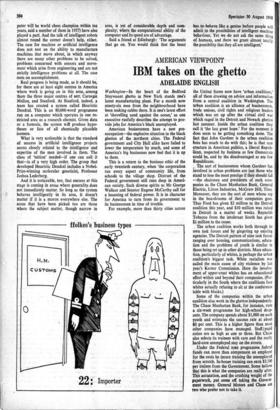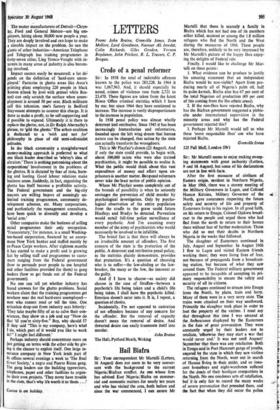IBM takes on the ghetto
AMERICAN VIEWPOINT ADELAIDE ENGLISH
Washington—In the heart of the Bedford Stuyvesant ghetto in New York stands um's latest manufacturing plant. For a month now ninety-six men from the neighbourhood have been making cables there. It is nam's latest effort at 'shovelling sand against the ocean,' as one executive ruefully describes the attempt to pro- vide jobs for America's black unemployed.
American businessmen have a new pre- occupation—the explosive situation in the black ghettos of the northern cities. The Federal government and City Hall alike have failed to lower the temperature by much, and some of America's big businesses now feel that it is up to them.
This is a return to the business ethic of the early twentieth century, when 'the corporation ran every aspect of community life, from schools to the village shop. Distrust of the Federal government still runs deep in Ameri- can society. Such diverse spirits as Mr George Wallace and Senator Eugene McCarthy call for a lessening of federal power. It is in character for America to turn from its government to its businessmen in time of trouble.
For example, more than thirty cities across the United States now have 'urban coalitions,' all of them drawing on advice and information from a central coalition in Washington. The urban coalition is an alliance of businessmen, trade unions, civil rights and religious leaders which was set up after the virtual civil war which raged in the Detroit and Newark ghettos last summer. Inside the urban coalition they call it 'the last great hope.' For the moment it does seem to be getting something done. The fact that John Gardner is the urban coalition boss has much to do with this; he is that rare creature in American politics, a liberal Repub- lican, respected by business as few Democrats could be, and by the disadvantaged as are few Republicans.
The sort of businessmen whom Gardner has involved in urban problems are just those who stand to lose the most prestige if they should fail —the chairmen and presidents of such com- panies as the Chase Manhattan Bank, General Electric, Litton Industries, McGraw Hill, Time. Moreover, they are the sort of men whose say in the boardrooms of their companies goes. Thus Ford has given $2 million to the Detroit coalition this year, and $10 million was raised in Detroit in a matter of weeks. Reynolds Tobacco from the intolerant South has given $1 million to the cause.
The urban coalition works both through its own task forces and by gingering up existing agencies. The Detroit pattern of nine task forces ranging over housing, communications, educa- tion and the problems of youth is similar to those being set up in other districts. Mass educa- tion, particularly of whites, is perhaps the urban coalition's biggest task. White racialism was called the main cause of city violence by last year's Kerner Commission. Here the involve- ment of upper-crust whites has an educational effect within and beyond their companies. (Par- ticularly in the South where the coalitions face whites actually refusing to sit at the conference table with blacks.) Some of the companies within the urban coalition also work in the ghettos independently. The Chase Manhattan Bank, for instance, runs a six-week programme for high-school drop- outs. The company spends about $1,000 on each youth and estimates the success rate at about 80 per cent. This is a higher figure than most other companies have managed. Staff/pupil ratios are as high as one to three. But Chase also selects its trainees with care and the really hard-core unemployed stay on the streets.
Under the Federal JOBS programme federal funds can more than compensate an employer for the costs he incurs training the unemployed from scratch. In-house training can earn $3,500 per trainee from the Government. Some believe that this is what the companies are really after. This accusation, and the crushing weight of the paperwork, put some off taking the Govern- ment money. General Motors and Chase are two who prefer not to take it The motor manufacturers of Detroit—Chrys- jer, Ford and General Motors—are big em- ployers, hiring about 50,000 new people a year. They are deeply involved and can hope to make a sizeable impact on the problem. So can the giants of other industries—American Telephone and Telegraph has training programmes in forty-seven cities; 'Ling Temco-Vought with in- terests in many areas of industry is also becom- ing involved.
Impact cannot easily be measured; a lot
de-
pends on the definition of 'hard-core unem- ployed.' Factories in ghetto areas like Avco's printing plant employing 220 people in black Boston (cheek by jowl with genteel white Bos- ton) can only scratch the surface when unem- ployment is around 50 per cent. Els& militants call this tokenism. tam's factory in Bedford Stuyvesant attempts to counter this charge. It is there to make a profit, to be self-supporting and if possible to expand. Ultimately it is there to replace the ghetto; not,4n Dr •Ralph Abernathy's phrase, to 'gild the ghetto.' The urban coalition is dedicated to a with and not for' philosophy in place of old semi-colonialist attitudes.
In the black community a straightforward moneymaking approach is preferred to *hat one black leader described as 'whitey's idea of altruism.' There is nothing patronising about the corporations' involvement in the problems of the ghettos. It is dictated by fear of riots, burn- ing and looting. Good labour relations make business sense. Suddenly, in fact, organising the ghetto has itself become a profitable activity.
The Federal government and the big-city mayors are willing buyers of seemingly un-
limited training programmes, community de- velopment schemes, etc. Many corporations, and particularly the management consultants, have been quick to diversify and develop a 'social arm.'
Other companies make the business of selling social programmes their only occupation.
Transcentury,' for instance, is a small Washing- ton-based corporation, financed by an anony- mous New York banker and staffed mainly by ex-Peace Corps workers. After eighteen months it has started to make a profit and is growing fast by selling staff and programmes to custo- mers ranging from the Federal government (how to persuade poor people to use hospital and other facilities provided for them) to gang leaders (how to get funds out of the Federal government).
No one can tell yet whether industry has found answers for the ghetto problems. Social workers claim that the training programmes get nowhere near the real hard-core unemployed— men who cannot read or tell the time. One articulate drop-out from industry says bitterly: They take maybe fifty of us -to salve their con- sciences, they show us a job and say •"Now do that 'Ill you're sixty-five." Boy, why should I? If they said "This is my -company, here's what
I do, which part of it would you like to work in?" I might feel different.'
Perhaps industry should concentrate more on just getting on terms with the other side 'by giv- ing it the chance 'to exploit itself. One large in- surance company in New York lends part of its offices several evenings a week to `The Real Great Society,' a negro and Puerto Rican gang. The gang leaders use the building typewriters, telephones, paper and other facilities to organ- ise their own projects. 'They never have trouble in the riots, 'that's-why its worth it to them.. .
Custos is on holiday.



































 Previous page
Previous page